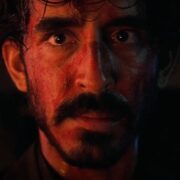WONDER: Uneven, Sappy Drivel
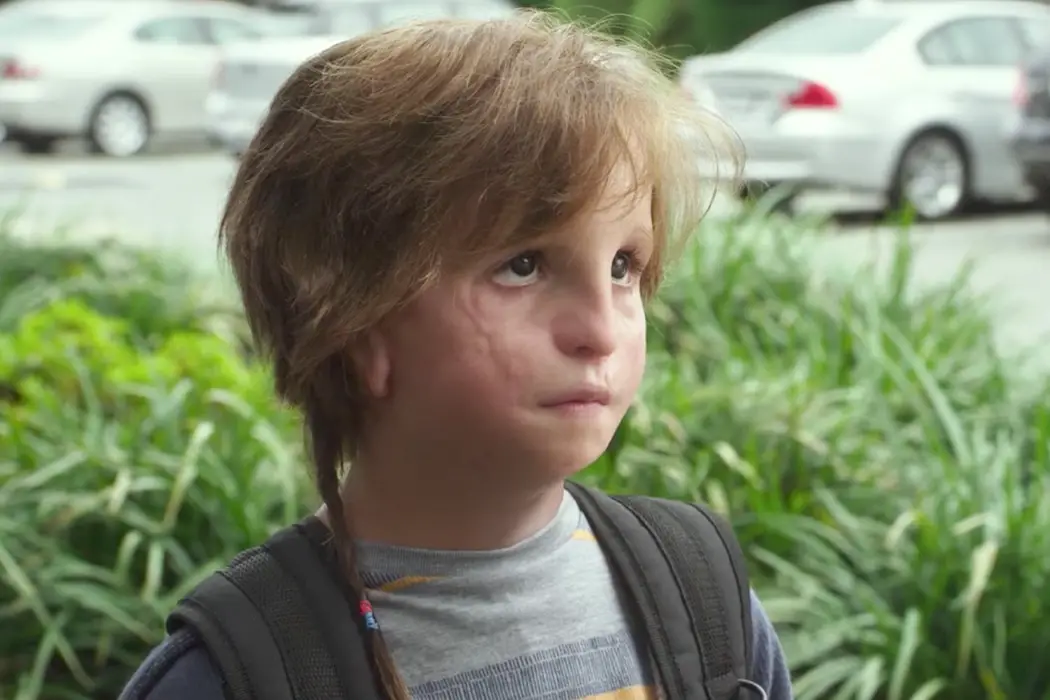
David is a film aficionado from Colchester, Connecticut. He enjoys…
Wonder seemingly has all the makings of a family-friendly coming-of-age drama; it’s focused on a boy unfortunately born with birth defects that attempts to make it in the world, is directed by Stephen Chbosky, known for his teen novel The Perks of Being a Wallflower and its subsequent film adaptation, and stars such recognizable faces as Julia Roberts, Owen Wilson, and the emerging young Jacob Tremblay, who already wowed in 2015 with his performance in Room.
Yet, despite all this working for it, Wonder is, in almost every conceivable way, a disaster. It’s jumbled, unfocused, poorly acted, and undeservedly sappy. I usually consider myself relatively uncynical when it comes to watching and reviewing movies, with the core understanding that, even if something isn’t necessarily made for me, there can still be something to celebrate about it. But, despite this, Wonder is such an incoherent mess that it’s a shame people will likely fall head over heels for it.
The Pullman Family
Wonder focuses on young August “Auggie” Pullman (Tremblay), a boy born with Treacher Collins syndrome, a birth defect that causes facial mutations, which, though curable through reconstructive surgeries, usually still results in noticeable facial differences. The film begins as Auggie is about to start school at Beecher Prep in NYC, marking the first time he will officially be going to classes with other kids, having been home-schooled before then.
Using voice-over and a title screen labeled “Auggie,” Wonder initially proceeded in almost exactly the direction I had expected. It focuses on the inherent struggles of not only being a kid unfamiliar with the wider world, but specifically one so noticeably different that it’s clear his appearance will be a distraction for some. Being treated differently at first, and eventually outright bullying, were sure to be topics that would emerge (and they do).
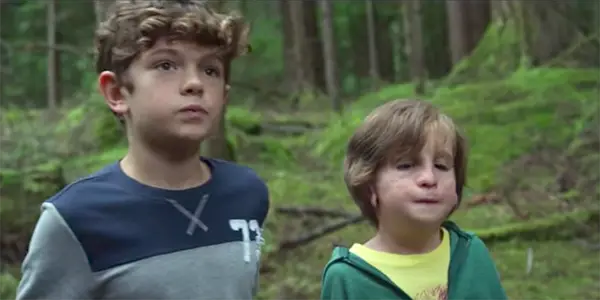
Yet, in an interesting diversion, Wonder then starts to focus on people other than just Auggie, including his sister Olivia “Via” Pullman (Izabela Vidovic), who is just beginning high school. As a normal teenager, she feels lost amongst her family, who are forced to give special attention to Auggie and therefore end up neglecting her. It doesn’t help matters when her best friend Miranda (Danielle Rose Russell), who has been ducking her calls over the summer, returns to school with a fresh new hairdo and subsequently starts to ignore her.
Though initially jarring, the focus on Via was an intriguing prospect, which not only allowed character development for someone outside of Auggie, but it allowed us to see how a person’s defect affects not only them, but the people around them as well. Additional credit should be given to relatively unknown Izabela Vidovic playing Via, who does her best with what ends up being some of the film’s more emotionally resonant scenes.
Likely in an attempt to duplicate the structure of the novel from which it is based, though, subplots soon start to emerge at exponential speed. After Via, we then get a background and story for Auggie’s friend at school named Jack Will (Noah Jupe), followed by one (for some reason) for Via’s ex-best friend Miranda. And once a new character’s background is introduced, the film then starts to dart from one story to the next, resulting in a pileup of half-assed character development that somewhat resembles a poorly built Jenga tower. Soon enough, the film starts to falter under its own weight.
What becomes lost amongst this mass of stories is the very reason we came to see the film in the first place: the story of Auggie. By the time the film finally decides to focus back on him in the last twenty minutes, it had already become too scattershot to be engaging once again.
Auggie’s Plight
Jacob Tremblay, almost unrecognizable under prosthetic makeup (yet still not close enough in resemblance to actual people with Treacher-Collins Syndrome), is likely the film’s standout performance. Though playing a character somewhat similar to the naive Jack Newsome in Room, he is also much more emotionally damaged, as a result of having to go through life looking very different from everyone else. His scenes are often the highlight of Wonder, especially when we see the world through his eyes.
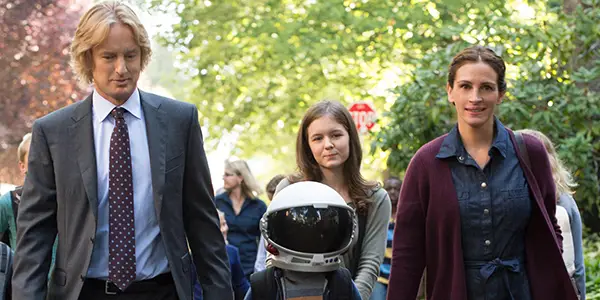
Despite its unfocused nature, there are some rewarding parts of Wonder, including a few fantasy sequences where Auggie imagines himself as an astronaut or amongst his favorite Star Wars characters. The film in these moments felt much like A Monster Calls, with a kid going through a traumatic experience in his life and imagining the world around him as being different than it is as a way of escaping. Unfortunately, Wonder doesn’t fully commit to this premise, occasionally coming back but mostly ignoring it to make way for even more unnecessary subplots.
Uninspired performances
Other than Tremblay, Wonder is ridden with poor or uninspired acting as a whole. Though it is admittedly hard to get believable performances from kids, there are few performances here that are passable. In addition, veteran actors Julia Roberts and Owen Wilson mostly phone in their performances, with their characters interacting with Auggie during a few key scenes but never really exuding much more beyond that. It doesn’t help matters that Owen Wilson‘s character goes mysteriously missing during much of the middle of the film.
Sentimental but sugarcoated
Sentiment within a film like Wonder would seem to go hand-in-hand. Marcelo Zarvos‘ plucky score does keep the film mostly lighthearted, tugging at the heartstrings when it needs to, while director of photography Don Burgess‘s camera is mostly grounded and level. As a whole, the film even somewhat succeeds at producing its intended hopeful melancholy, but it’s for all the reasons that I had hoped it would avoid.
Take one heart-to-heart exchange between Auggie and his sister Via, for example. Auggie had recently been talked about behind his back by a person he had previously called his friend, and as a result was feeling downtrodden and unwilling to go trick-or-treating for Halloween (his favorite holiday because, as he mentions, it’s the only time where he can wear a mask and be treated like everyone else). As a way to express empathy for her brother, Via mentions that she had also lost touch with a friend recently, and tries to explain that it’s a part of life, and sometimes these things happen. It’s a poignant and effective moment. Life, as one must learn, is not always fair, and this is an especially important lesson for someone as different as Auggie.
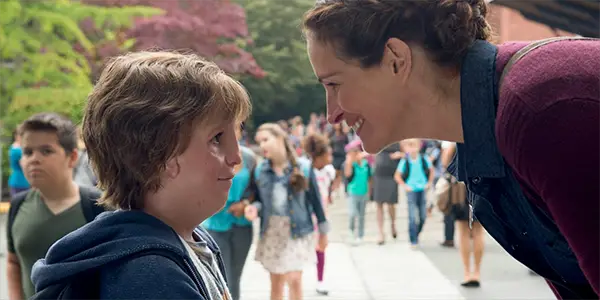
But, by the film’s conclusion, it has completely undercut this exchange by tidying up BOTH of these situations, and in a completely unearned way. According to Chbosky and company, this is the lesson you should get from Wonder: everyone is actually okay, everything happens for a reason, and, even if you don’t work especially hard for it, everything will work out for you in the end. For a film attempting to distinguish itself from the mindset of the helicopter parents that act as an antagonist at one point, it is surprisingly very much in alignment with those values.
The primary issue with Wonder is not that it is hopeful or inspirational, or even that it ends expectedly happy – it’s that it doesn’t really teach any hard-earned lessons about reality. Being different is not something to be ashamed of, but it’s something you have to learn to live with all the same. Through the eyes of Wonder, Auggie’s facial deformity is something that a majority of people are more than willing to both accept and praise after but a moment’s hesitation. And that’s, unfortunately, just not the reality of the world we live in. It’s a way I wish the world was, don’t get me wrong – but sugarcoating like this does nothing to dispel the very real notions of prejudice and discrimination that still run rampant in nearly every facet of society.
And yes, it’s possible to show both a grim reality and a hopeful outlook – just look at the Disney film Zootopia as an example, which ends happy but not after learning the ideal that true change comes from within. A film like Wonder just panders to the general audience, not inviting them to truly feel empathy for others but simply sit there, observe a sappy moment, and feel better about themselves afterward. Maybe we’d prefer to have these escapist moments considering the grim reality of the world around us on nearly a daily basis, but burying your head in the sand is, to me, not the answer.
Verdict: Wonder
Maybe I am being too harsh on what is essentially meant to be a lighthearted family-friendly drama. But I had at least hoped for more than what is present here. Wonder doesn’t ask much from you; it doesn’t really delve into the struggles of a kid born with birth defects beyond the bare minimum, it attempts, but ultimately fails to show the wider repercussions of this on his family, and its eventual result is the equivalent of having your cake and eating it too. It’s uninspired drivel that I had thought people would refuse to eat up at this point. Or perhaps, like Auggie’s fantasies, I’m just the only one left floating out in space.
What did you think of Wonder? Am I being too harsh on the film? Let me know your thoughts!
Wonder was released in the United States on November 17, 2017. For all international release dates. see here.
Does content like this matter to you?
Become a Member and support film journalism. Unlock access to all of Film Inquiry`s great articles. Join a community of like-minded readers who are passionate about cinema - get access to our private members Network, give back to independent filmmakers, and more.
David is a film aficionado from Colchester, Connecticut. He enjoys writing, reading, analyzing, and of course, watching movies. His favorite genres are westerns, crime dramas, horror, and sci-fis. He also enjoys binge-watching TV shows on Netflix.













